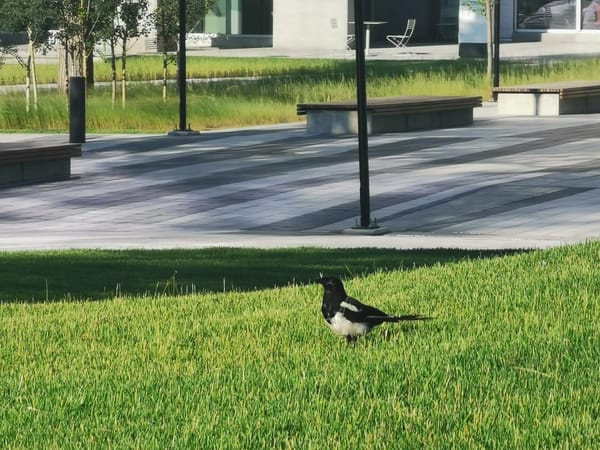Living into God’s ending

I don’t know about you, but I used to love apocalyptic films: Alien invasions, panicked pandemics, climate change catastrophes, government breakdowns, and nuclear fallout—our culture has depicted its own destruction in a myriad of ways. And I use to love them all.
At least I did, back when so many of the realities they described felt like fiction.
Now, they have all become a bit too believable.
One film that really jumped out at me a few years ago was a comedy called Seeking a Friend for the End of the World, an apocalyptic film where a giant asteroid is set on a collision course with earth.
Okay, so not exactly an original premise, but the film delivers exactly what it promises: a witty, if sad middle aged man—ironically, an insurance broker—who spends the world’s last days searching for a long lost lover to accompany him to the end.
It sounds like the chorus of a country western song. And, in fact, the film begins with the protagonist’s wife leaving him, literally running away as soon as she hears the news that the asteroid cannot be stopped.
When the world begins to end, suddenly people begin to feel that many of the things that had bound their lives, no longer hold true.
With two weeks left to live, almost nobody shows up for work.
With two weeks left to live, an unhealthy marriage is ended.
With two weeks left to live, an estranged father and son are reconciled.
This is what apocalypse reveals to us: when the rubber hits the road, what in our lives has lasting value? What remains true? In the language of our faith, what in our lives is of eternal consequence?
At the end of a world, we see all the illusions that have governed our lives more clearly.
At the end of an economy, we see we have saved a lifetime, to posses only paper.
At the end of a state, we see the boarders we have fought for, were lines on a map.
At the end of a river, we see the oil we have mined, will not quench our thirst.
At the end of a life, we see all the things we wanted to say, and didn’t.
At the end of a world we see things more clearly. We see things we just couldn’t see before. That is the gift of apocalypse.
[Jesus] also said to the crowds, ‘When you see a cloud rising in the west, you immediately say, “It is going to rain”; and so it happens. And when you see the south wind blowing, you say, “There will be scorching heat”; and it happens. You hypocrites! You know how to interpret the appearance of earth and sky, but why do you not know how to interpret the present time? (Luke 12:54-56)
Jesus warns us: pay attention. Keep watch for the changes around you like you keep with with the changes in the land. Be aware of the signs of the times around you, and be prepared to interpret them.
But what are the signs of the times around us? And what are they saying?
I think of the children starving in Gaza as a sign.
I think of the continuing war in Ukraine, Sudan, and many other regions as a sign.
I think of the homeless encampments in our cities as a sign.
I think of the mass migration of peoples in desperate need as a sign.
I think of the collapse of insect and bird populations as a sign.
I think of climate change as a sign.
And I think of the callousness of our leader’s responses to all these crises as a sign—a sign that we are living in an apocalyptic time, a time when our values as a society are being revealed, and a time when our values as disciples of Jesus are being revealed.
This may be a bit of a cliche—it's been said by and attributed to many people over the years—but I think its worth repeating: "the moral measure of a society is how it treats its weakest members."
And it’s not when things are going well that our characters are most revealed to us, it is when things are going badly.
I don’t know about you, but I think the signs tell us our world is suffering. And in the midst of that suffering, as disciples of Jesus, we are called to live now as if the Kingdom Jesus has promised us has already come on earth as it is in heaven.
What does that mean?
I think it means that, as our empires grow crueler, we are called to grow in kindness; as our economies turn austere, we are called to be generous; as our governments neglect strangers, we are called to invite the stranger in.
Now elsewhere in the Gospels, Jesus offers us a compass, a line in the sand, to help us to enter into moral and political discernment in these apocalyptic times:
Truly I tell you, just as you did it to the least of these who are members of my family, you did it to me. (Matthew 25:40)
In Jesus, we have been shown a vision of the ending God desires for this earth.
The good news this morning is that through Jesus, we can choose to live differently, because through Jesus, we know the ending of the story God is telling with Creation.
Spoiler alert: it’s a good one.
We know that God’s love, God’s power of redemption, runs deeper than the principalities and powers of this present darkness.
So let’s live the ending God is preparing for us, with us, and through us.
If this is an apocalyptic moment, a moment that will reveal our values, if this is a kind of end of the world as so many of us have known it, if we are actors in an apocalyptic film, how are we going to choose to live into God’s ending?
What are you doing now that you would do differently to live into God’s ending?
Which broken relationships are you in now, that you would repair or let go of to live into God’s ending?
Who are you called to offer mercy to now, to live into God’s ending?
I want to end with a glimpse of the Kingdom as I have seen it the last few weeks here at the Cathedral of the Holy Trinity in Quebec City. It was a glimpse I had of a small group of Jesus’ disciples, gathered around some tables and a stove, cooking up a revolution: preparing a simple soup for a Thursday lunch for who ever happens to drop by.
My friends, never underestimate the revolutionary power of a bowl of soup.
In the last few weeks I have seen this soup prepared, I have seen this soup eaten, and I have seen the grounds of our church house shared with isolated neighbours, friendly parishioners, recent mothers, folks who are marginally housed, religious sisters, curious tourists, and even a member of parliament.
This too is a sign of the apocalypse.
This is a sign of an alternative ending—an ending that is God’s ending.
A kingdom that seeks to welcome, to feed, and to bless.
A kingdom whose compass is the needs of the least, the last, and the lost.
My friends, whether or not you are members of this parish, you too are characters in the story that God is telling with Creation.
Thank you for everything you do to help us to live into God’s ending.



